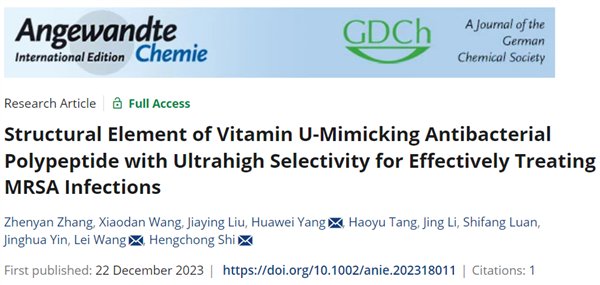【Angew Chem Int Ed】Structural Element of Vitamin U-Mimicking Antibacterial Polypeptide with Ultrahigh Selectivity for Effectively Treating MRSA Infections
作者:Zhenyan Zhang#, Xiaodan Wang#, Huawei Yang*, Shifang Luan; Jinghua Yin, Lei Wang*, Hengchong Shi*
关键字:Antibacterial Polypeptide, Selectivity, MRSA Infections
论文来源:期刊
发表时间:2023年

Antimicrobial peptides (AMPs) exhibit mighty antibacterial properties without inducing drug resistance. Achieving a much higher selectivity of AMPs towards bacteria and normal cells has always been a continuous goal to be pursued. Herein, a series of sulfonium-based polypeptides with different arms and degrees of polymerization were synthesized by mimicking the structure of vitamin U. The polypeptide, G2-PM-1H+, shows both potent antibacterial activity and the highest selectivity index of 16000 among the reported AMPs or peptoids (e.g., the known index of 9600 for recorded peptoid in “Angew. Chem. Int. Ed., 2020, 59, 6412.”), which can be attributed to the high positive density of sulfonium and the regulation of hydrophobic chains in the structure. The antibacterial mechanisms of G2-PM-1H+ is primarily ascribed to the interaction with the membrane, production of reactive oxygen species (ROS), and disfunction of ribosomes. Meanwhile, altering the degree of alkylation leads to selective antibacteria against either gram-positive or gram-negative bacteria in a mixed-bacteria model. Additionally, both in vitro and in vivo experiments demonstrate that G2-PM-1H+ exhibits superior efficacy against methicillin-resistant Staphylococcus aureus (MRSA) compared to vancomycin. Together, these results show that G2-PM-1H+ possesses high biocompatibility and is a potential pharmaceutical candidate in combating bacteria significantly threatening human health.